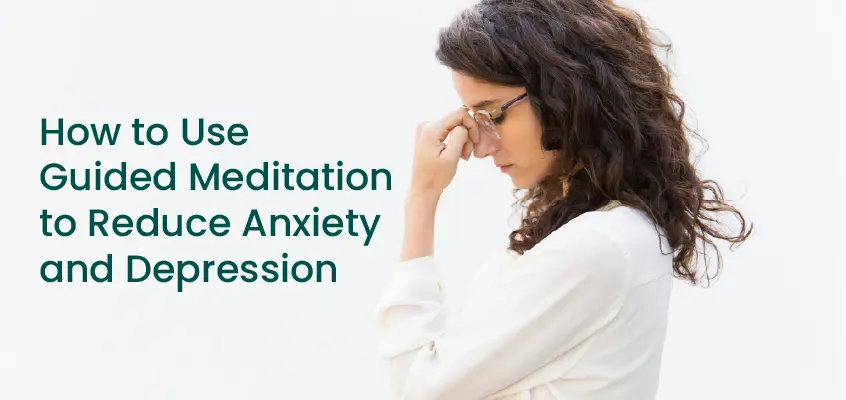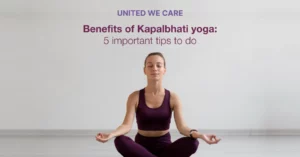Introduction
If you suffer from anxiety or depression, you know how debilitating those conditions can be. You might feel stuck in a never-ending cycle of negative thoughts and emotions, making it hard to enjoy life. But there is hope. Meditation is a proven effective treatment for both anxiety and depression, and it’s something you can do at home with just a few minutes of practice each day.
In this blog post, we’ll guide you through a simple meditation exercise that you can use to reduce anxiety and depression. We’ll also provide tips on making the most of your guided meditation.
What is guided meditation?
Guided meditation is a form of mindfulness meditation in which a narrator guides you through a visualisation or relaxation exercise. The goal of guided meditation is to help you focus and become more aware of your thoughts, feelings and body. Guided meditation can reduce anxiety and depression, improve sleep, and increase self-awareness.
Benefits of guided meditation
Meditation is an effective way to reduce anxiety and depression. Guided meditation is a form of meditation that uses an audio or video recording to help you relax and focus your thoughts. There are many benefits to guided meditation, including the following:
1. Reducing stress and anxiety: Guided meditation can help you feel more relaxed and reduce the symptoms of anxiety and stress.
2. Improving sleep: If you have trouble sleeping, guided meditation can help you fall asleep faster and sleep more soundly.
3. Increasing focus and concentration: Guided meditation can help you focus on the present moment and clear your mind of distractions.
4. Boosting mood: Guided meditation can improve your mood by increasing feelings of happiness, peace and well-being.
5. Supporting overall health: Meditation can positively affect overall health, including reducing blood pressure, improving heart health and boosting immunity.
How to practice guided meditation
If you’re looking to reduce anxiety and depression, guided meditation can be helpful. Guided meditation is a form of mindfulness meditation that focuses on a specific object or thought. The goal is to keep your mind from wandering and becoming more aware of the present.
There are different ways to practice guided meditation. You can find audio recordings or written instructions online or in books. Once you’ve chosen a method, find a quiet place to sit or lie down. Ensure you won’t be interrupted for at least 10-15 minutes.
Close your eyes and begin to focus on your breathing. Listen to the sound of your breathing as you inhale and exhale. If your mind begins to wander, gently bring your attention back to your breathing. As you continue to meditate, you may notice thoughts and emotions emerge. Please don’t focus on them; observe them and let them go.
Don’t worry if it’s hard to focus first; guided meditation takes practice! With regular guidance and exercise, you’ll be able to reduce your anxiety and depression significantly.
How does guided meditation help to reduce anxiety?
Guided meditation is a form of mindfulness meditation in which a teacher or a recording leads you. Studies have shown that guided meditation can reduce anxiety, stress and depression.
Guided meditation can help to reduce anxiety by teaching you how to focus on the present moment and become more aware of your thoughts and feelings. The goal of guided meditation is not to get rid of all of your anxiety but to help you manage it more constructively.
When you meditate, you focus on your breathing or a mantra (a repeated word or phrase) and let go of all other thoughts. It helps to train your mind to be more focused and less reactive to stressful situations. In turn, this can help reduce your symptoms of anxiety.
There are many different types of guided meditation, so it is essential to find one that works for you. If you are new to meditation, starting with a short 10-minute practice each day may be helpful.
How does guided meditation help to reduce depression?
Depression is a feeling of sadness, emptiness or hopelessness that lasts for more than a few days. It can be mild, moderate or severe and can interfere with your daily life. Research has shown that guided meditation can help to reduce depression. A study published in the JAMA Internal Medicine journal found that people who participated in an eight-week mindfulness-based stress reduction (MBSR) programme significantly reduced depressive symptoms compared to those who did not participate in the programme.
Guided meditation can help reduce depression by teaching you to focus on the present moment and accept your thoughts and feelings without judgment. The practice can also help to increase self-compassion and reduce introspection, both of which are associated with depression.
How to practice guided meditation exercises
Here’s how to practice guided meditation:
1. Pick a comfortable place to sit or lie down.
2. Close your eyes and take a few deep breaths.
3. Focus on your breathing and let go of any thoughts that come into your mind.
4. Visualise a peaceful place, such as a sunny beach or a blooming meadow.
5. Imagine yourself in that place feeling relaxed and at peace.
6. Stay in that state of mind for as long as you like before slowly returning to the present moment.
Conclusion
Guided meditation can be a helpful tool in reducing anxiety and depression. If you’re looking to improve your mental health, you should give this technique a try. Finding a method that works for you is essential, so experiment with different styles until you find one that suits you best. United We Care has licensed therapists who can guide you through overcoming stress, anxiety and depression. Book a free consultation with us today!












